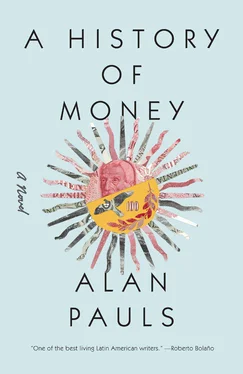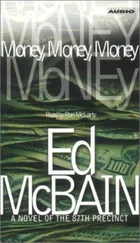At one point he turns and looks behind him, toward the house, and, after making sure that his mother isn’t stationed at a window, watching him, he gets down from the wall, still clutching his suitcase, and approaches the edge of the sidewalk, then looks as far as he can down the sloping street his father appears on every summer, always little by little, like a survivor emerging disheveled but proud from some abyss, head first, bald, roasted, gleaming, with its two strips of curly hair growing carelessly at the sides, then shoulders, then his torso in a freshly laundered shirt. But he peers down a whole scorched block of heat haze, and all he can make out is an intimate congress of two ice cream vendors who have crossed the trunks of their tricycles in the afternoon sun and are counting the money they’ve made over the course of this magnificent day, and perhaps lamenting the fact that they’ve already run out of merchandise, at barely five past four, with at least two or three good hours of selling left.
With a pang of desperation, never taking his eyes from the deserted street, because there’s nothing he fears more than what he might find if he turned back toward the house now (his mother’s sympathy, the merciful, nunnish solidarity with which she opens her arms to offer him asylum, and the sequence of hurdles awaiting him a little later on: the gate, and the gravel path, and the house, and his private room on the first floor, whose papered walls covered with life preservers and anchors, nautical knots, an ape dressed as a sailor — childish, pastel versions of the motifs that decorate the restaurants by the port — he knows and hates from memory), he searches for the tickets, unfolds them on his thigh, and tries to find the departure time in the puzzle of dates and numbers that the tickets have always been, but which he’s only noticing now, precisely when he most needs them to be clean and legible, and for a moment he only has eyes for the one thing that would relieve him, any number higher than four, whether it’s the date or the bus number or the company’s phone number or the arrival time. But eventually he finds the departure time, he finds the words departure time and reads four and he feels as though he’s dying.
He feels as though he’s dying. Everything stops moving around him, like a liquid losing its fizz and falling into a solid, permanent repose. He’s still facing the sloping road, down which a ball spat out of a neighboring garden starts to bounce, so he can’t see the house, but he can feel it, he can sense the shape of the porch, the slightly jagged outline of the façade. He considers running away. Anything, he thinks, but go back. Then he hears his mother’s voice calling to him from the other side of the gate: “There must have been some problem,” she says dismissively, as though trying to play it down: “He’ll be here soon. Come here, let’s wait for him inside.” He turns around and starts to go back. His mother opens the gate for him, and to his ears the creaking of the rusty hinges sounds like the steps that lead to the gallows. When he reaches the familiar, shifting surface of the gravel, he can’t take any more, and he bursts into tears. His mother puts a hand on his shoulder, a light hand that’s intended to go unnoticed. She’s tactful enough not to hug him. She knows he couldn’t bear it. But even so, he shakes off her arm and walks on, crying. And when he sees the huge bulk of the mansion in front of him, almost falling on top of him, he hears an unmistakable voice behind him, shouting his name.
He turns around and looks at his father, stunned. He doesn’t recognize him. He doesn’t know who he is, why he’s smiling at him like that, what could compel him to put that leather bag on the ground and open his arms and stretch them out toward him, inviting him to run up and hug him. It’s past four in the afternoon, and there’s no reason for his father to exist anymore. They’ve missed the bus, the trip’s a lost cause, and his father — along with everything associated with him in the possible world that’s just been obliterated by his lateness: the sand dunes on the north beach; the Croatian guesthouse; pancakes after the beach; mighty defecations in the pine forests; nocturnal pinball, table football, and go-karting marathons in the Combo Park on Avenida Tres — must have vanished too, irretrievably. The idea that once one possibility has been lost and another might spring up and replace it is a late conquest of the imagination. He hasn’t crossed that threshold yet. For him, a possibility is always just one possibility: if it ceases to exist as a possibility, the world that accompanied it must also cease to exist, entirely and forever.
So he no longer has a father. He won’t have one until thirty seconds later, an interval he spends imagining and getting used to the idea of his life from that moment on; not only his immediate life, in which he’ll no doubt be condemned once more to the four walls of the mansion in Mar del Plata, but also everything that will follow, going back to school and seeing his classmates again, all exactly the same while he’s a hundred percent different, and the moment during one recess, which he’s already glimpsing with an almost painful excitement, when he allows himself the pleasure of delivering the bombshell: I don’t have a father anymore. But in spite of all this, thirty seconds later that man is still there, standing with his arms open and smiling for some invisible photographer, still claiming the rights he’s just lost, above all the right to look at him and make direct contact with him, as if there were nothing separating them, not air, nor the shadows of trees, nor the blinding reflections of the sun, nor the dust that’s sometimes raised by the wind when it swirls around the entrance to the house, and of course not his mother, with whom he hasn’t exchanged a look or even a word since he arrived, not even to agree to the essential technical details — the date of their return, sun protection, food, his toothbrush, the benefits of bathing with some degree of regularity — which his father can usually only bring himself to consider at the last minute, with one foot on the bus, and always reluctantly, as though by considering them he were ceding to the will of a woman who, even though she can’t bear him, even though she refuses to say his name and forbids him to come upstairs when he comes to fetch him from the apartment on Ortega y Gasset, insists on keeping him and delaying his departure every February 1. And not only is he still there, he’s also smiling and telling him in his most peremptory tone not to be like that, that there’s no need to “get worked up.” That yes, they have indeed missed the four o’clock bus, but that they can miss the next one, at four thirty, too, and the next, and five, twenty, a hundred more buses, they can miss every bus in the terminal at Mar del Plata and in every bus terminal in the world. Because they, he — he points to him with his index finger, the same finger that one Saturday morning a few years earlier took a line of foam from his own face and put it on the end of his nose while he stood beside him, looking up at him shaving — and he — and he points to his own chest with the same finger, to the very center of the V formed by the two panels of his unbuttoned shirt— they can go to Villa Gesell when they like, whenever they feel like it, whenever it suits them. Right now, if they want to: all they have to do is put one foot on the street and that’s it, they’re already on their way. Because they, he says, aren’t taking the bus to Villa Gesell. They’re taking a taxi.
It’s 103 kilometers away. He doesn’t know that, of course. Not in those terms, anyway. But whatever he lacks in the way of conventional measurements he makes up for with a certain awareness of proportion, and he knows that any journey that’s usually taken by long-distance bus, no matter how decrepit and slow the bus is, or how many times it stops en route, cannot be translated to any other form of wheeled transport — apart from your own car, and, as far as he knows, his father doesn’t have his own car, he hasn’t had one since he relinquished the blue Auto Unión, whose congested motor he still seems to hear sometimes in his dreams, and he isn’t considering getting another, as he frequently promises, always in a loud voice and with the emphatic conviction of a militant, confident that this snub will be enough to bring down the entire automotive industry; and in fact he doesn’t have another until two or three years later, when the need to please a girlfriend who can’t stand going on vacation on public transport compels him to buy a cream-colored secondhand Fiat 600. A bus’s relation to a taxi, or more to the point its lack of relation, its striking incommensurability, seems to him the same as that of a plane to a bicycle, for example, or an ocean liner to one of the inflatable mattresses on which he likes to travel very slowly from one end of swimming pools to the other with his eyes half closed.
Читать дальше












